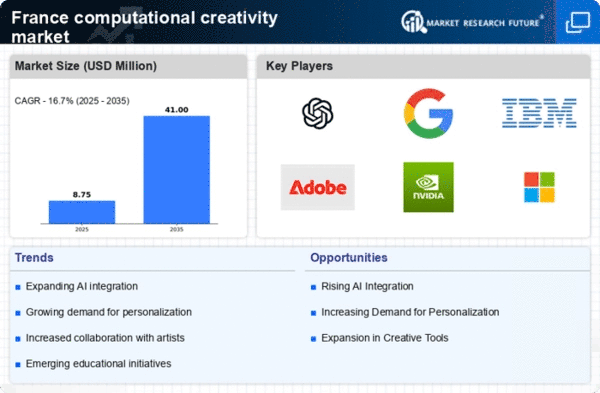Cultural Embrace of Technology
The cultural landscape in France is increasingly embracing technology, which serves as a catalyst for the computational creativity market. French artists and creators are progressively integrating digital tools into their work, reflecting a broader acceptance of technology in creative fields. This cultural shift is evident in various sectors, including fashion, music, and visual arts, where traditional methods are being augmented by computational creativity tools. As of 2025, approximately 60% of French creatives report using AI-driven tools in their projects, indicating a strong trend towards technological integration. This cultural embrace not only enhances the creative process but also encourages collaboration between technologists and artists, fostering a rich environment for innovation. The resulting synergy is likely to propel the computational creativity market, as more individuals recognize the potential of technology to enhance their creative expression.
Investment in Creative Startups
The influx of venture capital into creative startups is a notable driver of the computational creativity market in France. In recent years, there has been a marked increase in funding for companies that leverage AI and other technologies to enhance creative processes. In 2025, investment in French tech startups is projected to exceed €5 billion, with a significant portion directed towards those focused on computational creativity. This financial backing not only supports the development of innovative tools but also fosters a vibrant ecosystem where new ideas can flourish. As these startups emerge, they are likely to challenge established players, driving competition and encouraging continuous improvement in the quality and functionality of creative tools. This dynamic environment is expected to propel the computational creativity market forward, creating opportunities for collaboration and growth.
Technological Advancements in AI
The rapid evolution of artificial intelligence technologies is a primary driver of the computational creativity market in France. Innovations in machine learning and neural networks enable more sophisticated creative tools, allowing artists and designers to enhance their work. In 2025, the AI sector in France is projected to grow by approximately 25%, indicating a robust demand for AI-driven creative solutions. This growth is likely to foster a competitive landscape, encouraging companies to invest in advanced computational creativity tools. As a result, the integration of AI into creative processes is expected to streamline workflows and improve efficiency, thereby attracting more professionals to the market. The increasing accessibility of these technologies may also democratize creativity, allowing a broader range of individuals to participate in creative endeavors, thus expanding the market further.
Rising Demand for Digital Content
The surge in digital content consumption is significantly influencing the computational creativity market in France. With the proliferation of social media platforms and streaming services, there is an insatiable appetite for high-quality visual and audio content. In 2025, the digital content market in France is anticipated to reach €10 billion, reflecting a growing trend towards digital engagement. This demand compels creators to adopt computational creativity tools that can produce engaging and innovative content efficiently. As brands increasingly seek to differentiate themselves in a crowded marketplace, the need for unique and compelling creative solutions becomes paramount. Consequently, the computational creativity market is likely to see an influx of new players and technologies aimed at meeting this demand, further driving innovation and growth within the industry.
Educational Initiatives in Creative Technologies
Educational institutions in France are increasingly incorporating computational creativity into their curricula, which is a significant driver for the market. As of 2025, over 40% of art and design schools in France offer specialized programs focused on AI and digital creativity. This emphasis on education is crucial for preparing the next generation of creators to utilize advanced tools effectively. By equipping students with the necessary skills, these initiatives are likely to foster a more innovative workforce, capable of pushing the boundaries of creativity. Furthermore, partnerships between educational institutions and tech companies are emerging, facilitating knowledge transfer and practical experience. This collaboration not only enhances the learning experience but also stimulates interest in the computational creativity market, as students and educators alike explore the potential of technology in creative fields.
















